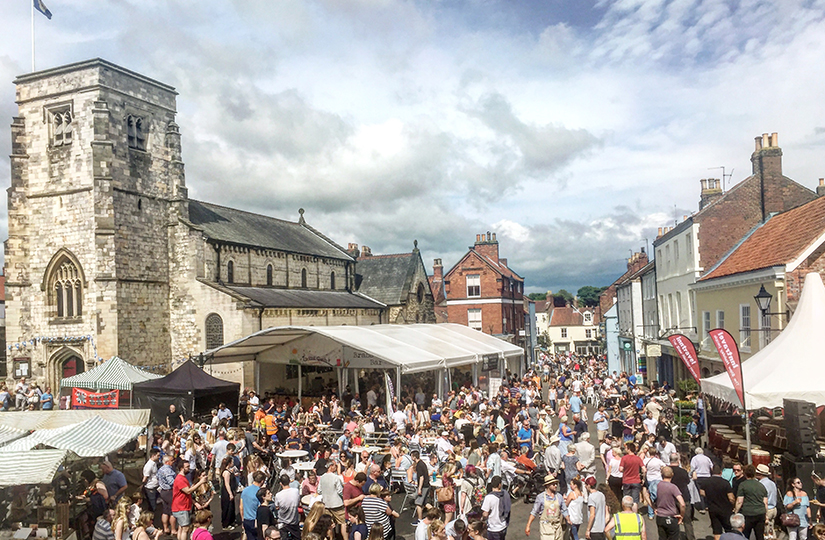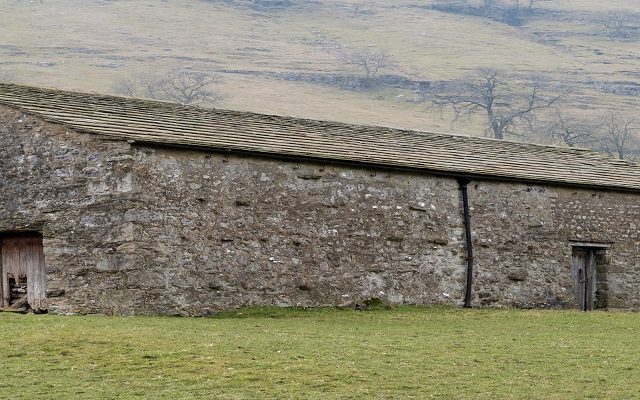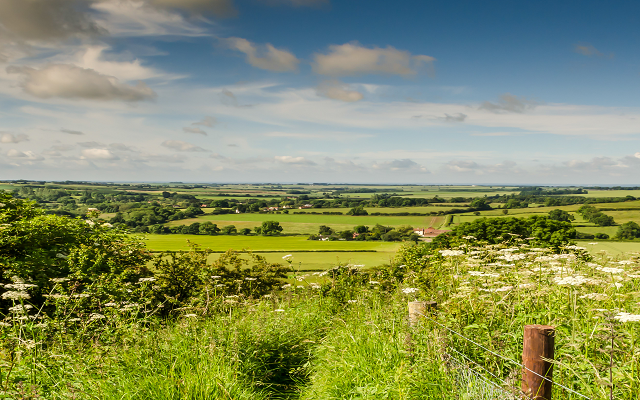Businesses we admire: Fitzwilliam Malton Estate
Malton is enjoying a renaissance.
The town has been positioned as a hub of artisan food production and a destination for foodies – a fine example of ‘placemaking’ spearheaded by Tom Naylor-Leyland, whose family own the Fitzwilliam Malton Estate which is landlord to much of the town.
Now known as the Food Capital of Yorkshire, Malton’s decade-long transformation has seen businesses open, new life breathed into the high street and the buzz brought back to the historic town centre.
Ed Mansel Lewis, head of Strutt & Parker’s Rural Ambitions team, spoke to Tom to find out more.
Ed Mansel Lewis (EML): Tell us about the origins of your vision for the town?
Tom Naylor-Leyland (TNL): We didn’t set out to create Yorkshire’s food capital. We were trying to deal with the problem of empty commercial properties on the high street, with Malton no different to any other rural high street in that respect.
Ultimately, it’s about footfall, and people spending money in the shops and keeping the businesses going. We knew we needed a unique selling point (USP) to get people to come to the centre of town.
My passion has always been food and, when I moved back from London to join the business, I started researching local producers. I couldn’t believe the range of different specialist producers there were in the county of Yorkshire.
When I worked in Sally Clarke, a restaurant in London, I used to be positively inspired at Borough Market – I was amazed by how they used to shout about Yorkshire’s produce, whether it was lobsters from the coast or partridge and grouse from the moors. It even turned out that the Ginger Pig Butcher has its farm eight miles from Malton!
And so it made me think: ‘If this was in Italy or France, this would be the Tuscany or the Sienna or the Veneto – areas famous for their produce’. So, it seemed a natural thing to promote Yorkshire food in Yorkshire, with Malton at the heart of that.
EML: How did it go from idea to reality?
TNL: We had no experience, but the obvious starting point was to bring all these producers together in a food festival, which we tried to do in 2009.
We had 25 stalls and 1,000 people, which seemed really exciting at the time. It then grew quickly. And we now have over 40,000 people who come for two days, every year. It’s called Malton Food Lovers Festival, and it has become the central promotional event, through which we celebrate the town and Yorkshire food.
It’s a free festival. We could have easily done it in a big tent in a field and charged for tickets, but that would have separated the festival from the town, and we really wanted people to get into the centre of town, and the stalls to be in the little streets and alleyways so that you’re discovering places as you go.
Having that many people in the streets – and having all the roads closed – creates a huge amount of atmosphere. It generates this incredible buzz which I’ve not felt at a food festival in a massive tent.
We’ve had quite a lot of famous chefs, which has helped in this age of celebrities. It was Antonio Carluccio who first used the phrase ‘Yorkshire’s Food Capital’ and we’ve used the name ever since!
EML: How did the project evolve?
TNL: The festival turned out to be a brilliant weekend in terms of promotion and trading for that one weekend, but it didn’t solve our problem of vacant premises and we wanted people to come to the town 365 days a year.
So we decided to do a mini version of it called the Malton Monthly Food Market, which runs between March and December. We did food demonstrations and made parking free for the first two hours to give the message that we were open for business. I’ve even done a few food demos on stage where I have burnt toast in front of a live audience, which was very embarrassing!
Typically, it brings around 3,000-5,000 people and it’s generally the best day of the month for the bricks and mortar traders. We quickly realised we really needed people to spend a little bit longer than just an hour in town. We invested in the Talbot Hotel, which we ran ourselves for about seven or eight years, but is now let to the Coaching Inn Group. We also developed the Malton Cookery School, which is a really important part of the message that it’s not just about going to a market or festival, but rolling your sleeves up and actually cooking yourself.
The idea of ‘experience’ is so important to the vision. We’ll never be able to compete with out-of-town shopping centres, so what we’ve tried to add is theatre and drama.
EML: You’re always photographed wearing an apron – that’s such a clever way of showing that it’s a place to come and be involved.
TNL: You’re absolutely right, although I never thought about it in that sense. I used to work in a deli in London and always used to wear an apron so it always felt like my foodie uniform. When I started the food festival, I insisted that all of the people working on the events wore the apron.
The most important part of the whole project happened about three or four years ago when we went out and advertised for people to move their food business to Malton, not just to sell but to actually make the products in town on an artisan scale so that the customers can come in and see, for example, bread baked or beer brewed or chocolate tempered.
By this time, we’d built up that reputation as a foodie destination, which allowed us to go honestly to food producers and tell them we had a brand around the food festival. After that, we really developed the brand ‘Visit Malton, Yorkshire’s Food Capital’.
We’ve had 25 food and drink businesses open in the past six years, including five bakeries, a butcher, a coffee roaster, a wood-fired pizza place, a gin distillery, a gelato producer, a macaroon maker, three new breweries including one called Brass Castle that seems to win every award going and a vegan and vegetarian deli that makes all their food right in town.
We encourage these businesses to re-think the traditional approach to food production, where artisans would make a product in a back room of their premises and display it in the front. Instead, we say ‘make your product in the front of the shop, so your customers have to go past the making of the product to buy it at the back’.
In the past couple of years, we’ve had other non-food producers join us, including this amazing handmade soap company who are making delightful orange blossom and lavender soaps and patchouli on site, so the town smells of chocolates and burnt orange and it’s great.
EML: What’s next for Malton?
TNL: The events are still a really important part of the plan because they get everyone into the town. Two years ago, we started a music festival called Meadow Fest. It was one of the first paid-for events in Malton, and it was really well attended. We had Levi Roots playing live, which was great. We couldn’t do it in 2020, but we have a date scheduled for 2021.
We also created the Marathon de Malton, which I adore. It’s based on the Marathon du Médoc (it’s actually a 10k race). It’s Britain’s tastiest 10k! You run in fancy dress, drink gin, drink delicious wine, eat lobster brioche rolls and roast grouse and Yorkshire puddings, all at 10 different food and drinks stops around the course. It’s a very feel-good event that starts and finishes in the marketplace and it’s a very special day.
EML: Have you solved the problem of high vacancy rates that you originally set out to fix?
TNL: As far as I’m aware, the vacancy rate which was pretty high 10 years ago has come right down, which is great.
EML: The thing that initially drew me to wanting to interview you was the fact that almost all of your Instagram posts are about your tenants’ businesses. That’s a very interesting way to consider your responsibility as a landlord, because it made clear that you knew that the resilience of the estate was intrinsically linked to the resilience of each individual business.
TNL: Absolutely. I mean, I’m quite clueless probably about a lot of things, but that aspect of it seemed to me very obvious. If they succeed, we succeed.
EML: Do you try to strike a balance between the number of food producers and accommodation providers in Malton?
TNL: There wasn’t that much accommodation at the beginning. We refurbished The Talbot, but that only had 26 rooms. The Mount Hotel, which had been empty for many years, is now open and has 13 rooms. The Old Lodge has also opened.
A few years back, if people came in for the day, they’d stay on the coast or on the Moors. Now there are suddenly B&Bs, Airbnb options and hotels popping up.
What’s so great is that lots of people have also moved here. One couple said when they came to the food festival the first time they decided to move here, and another couple decided to move to Malton after watching the film we made about the food festival.
EML: Any final words of wisdom?
TNL: Although I am in some ways a figurehead for the town, it has genuinely been a team effort, by people active in the estate, by the producers who took huge leaps of faith to come and make their product in Malton, and indeed by councillors supporting the schemes that we have for new buildings. So it’s a team effort – and that’s the best part of it really.
This article is part of a wider Land Business Insights publication on The Future of the Estate, which includes a section on the role of rural placemaking in farm and estate diversification. Navigating the changes that lie ahead for rural estates will require innovative thinking and a proactive approach. The team at Strutt & Parker is here to help you on that journey, working alongside you to evaluate your options and turn plans into action. Please do get in touch if you would like to talk about any of the report’s contents.






